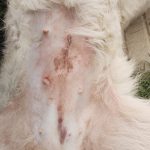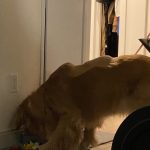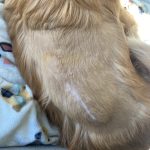Hello
Try to keep your dog from licking the incision and follow up with your vet asap.
Last night about 8pm my dog had lump around her eyes and her mouth was swollen, this morning they have gone down but now she has got some more on her head, they seem to not hurt her but they are very itchy for her.
Comments
My 2 year old female dog was neutered last week and the incision site is looking concerning. The only veterinary clinic close to us is closed today and I am worried about infection or other issues. The dog is an obssesive licker and I don’t know if the wound is healing ok.
Comments
My dog (beagle, 4yr) has been diagnosed with potential IVDD. Vet provided meds for 2 weeks to see if there is improvement.
She is still able to walk, eat and urinate/poop normally. However, when she gets spasms in her neck, you can see she is in pain and she cries.
Is there anything else I can do to release her pain? Massage? Ice pack? Heat pack?
Also, the Vet did not say that I needed to crate her. She is pretty much always laying down, getting up when she wants to go out to pee or to eat. Should I still crate her? She is not used to it so I’m afraid she will try to fight out.
Comments
7y/0 M golden retriever had mass removed near spine. Incision site was relatively large and is healing quite nicely . Since about day 5 post op he has had a sac of fluid underneath the skin (diagnosed by vet as seroma). After 2 fine needle aspirations, 2 rounds of anti-inflammatory and an antibiotic, the seroma has not gone down in size. He has been very minimally active (just goes out to use potty). Seroma has not reduced size and vet said it is ok to ease back into routine.
Any advice on how long this will last and if playing with buddies at park (he wrestles his one best friend) will delay healing? It seems no activity is not helping the swelling anyway.
Just want my pup to have a bit more fun during the day he’s been isolated for over one month!
Comments
My dog can’t walk I jut want you can say a second opinion my vet said he has Spine Osteochondromalacia and I can’t find on giogle something like that I’m afraid he was wrong diagnosed
Comments
I feel every time I need to see a veterinary, no matter how small a problem, I end up spending over $500. How do others afford to take care of their pets? I feel these costs have greatly gone up over the last many years. I understand this is a service that is hard for people to turn down, since our pets are our family. Just like healthcare, food and education. Necessary things in life seem to have the largest markup. Where is the rip off coming from? I read veterinarians are not rich. I understand. So what is the problem? Is it the ownership of the company by someone that is only in it for money and makes all the calls? Opaque costs? Lack of transparency? Why does a checkup to see if there is an ear infection cost $500 even if there is no issue and is just over concern from the parent? Why am I charged $80 for an “exam” that literally has nothing to do with the actual exam for the specific problem that brought me in the first place. Why isn’t it just called a visit fee which is exactly what it is. Is it the business owner? Is it the practice? Is it a field that is able to be exploited due to our love for our family pets? Constantly pissed the F*ck off that veterinaries that I used to frequent for years suddenly change and now cost a car payment or mortgage for every non emergency simple visit.
Comments
Hi… my dog had that dry flaky piece of onion in his mouth last night.. it was small and he only had it in his mouth for a minute until I noticed and took it out… I’m just super scared he’ll get sick.. any advice?
Comments
Hi,
My 1 year old lab was taken for neutering. We were aware that he would be a crytorchild situation as his 1 testicle was not descended. VET did check for 2nd testicle by his abdomen incision but couldn’t find the other testis for a long time. N now recommending to go for a higher level ultrasound with a surgeon..to confirm if there is another testicle or not in the body. N then do the next procedure accordingly.
1. Is that possible to have just one testicle in Labrador dog?
2. If its hard to find the undecended testicle via ultra sound, can we take plan B – the visible n descended testicle is removed n then blood test is done in 4 -5 months for testosterone hormones in blood if anything changes to be sure if there is another testicle in body?
Youemf valuable inputs are much appreciated
Thanks mahesh
Comments
hi! my dog is a 3m old shepherd mix and she was attacked by another dog, she has multiple fractures in her jaw. I was referred by Dr. Trout to UPenn but they’re quoting 6-10k and I just dont have it, I’m very young so no one will lend to me and rescues that I’d contacted basically said they would euthanize because of the costly procedure, shes only a baby and I really want to save her, is there any financial aid for hardships like this anyone can recommend? Dr Trout said to get in contact with Dr. Magnifico and her practice referred me here to get in contact with












Hello!
Could she have possibly been stung by a bee? allergic reaction?
You can give benadryl 25mg, it is 1mg per pound… for instance if she is 50pounds, she would receive 2- 25mg tablets. This can be given every 8-12 hours. If she does not improve, I would reach out to your local vet for a check up.
Hope this helps
– Autumn